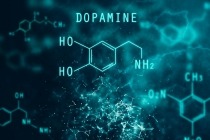
Scientists have long believed that people recovering from cocaine addiction often relapse because their brains’ reward circuits have been rewired by prolonged drug use, but the exact mechanisms have been unclear. An NIH-funded animal study has linked cocaine withdrawal to altered gene expression in a brain region affected by addiction.
The results showed that the changes in gene expression stem from the attachment of dopamine, a neurotransmitter in the brain, to histones, proteins that wrap around DNA and help regulate genes. Previous research had shown that dopamine contributes to cocaine addiction by acting as a chemical messenger, transmitting signals between nerve cells, but the molecule’s role in altering gene expression by modifying histones was unknown.
Additional experiments revealed a causal link between the dopamine-induced changes to gene expression and dependence on cocaine. When the investigators blocked the fastening of dopamine to histones in subjects undergoing cocaine withdrawal, they saw a significant reversal of the gene activity changes, and a lessening of cocaine-seeking behavior. These findings show that the altered gene activity pattern has an impact on behaviors associated with drug craving.
This study has uncovered an unexpected role for dopamine in altering gene expression in a brain region associated with addiction upon withdrawal from cocaine. By identifying biochemical changes that persist in nerve cells following cocaine use, the findings provide insight into the molecular basis for relapse and point to new strategies for preventing it.
The study, published in Science, was supported by the National Institute on Drug Abuse, the National Institute of Mental Health, and the National Institute of Neurological Disorders and Stroke.
Study:
- Ashley E. Lepack; Craig T. Werner; Andrew F. Stewart; Sasha L. Fulton; Ping Zhong; Lorna A. Farrelly; Alexander C.W. Smith; Aarthi Ramakrishnan; Yang Lyu; Ryan M. Bastle; Jennifer A. Martin; Swarup Mitra; Richard M. O’Connor; Zi-Jun Wang; Henrik Molina; Gustavo Turecki; Li Shen; Zhen Yan; Erin S. Calipari; David M. Dietz; Paul J. Kenny; Ian Maze. Dopaminylation of Histone H3 in Ventral Tegmental Area Regulates Cocaine-seeking. Science.
